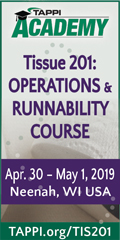
| Archive/Subscribe | TAPPI.org | Advertise | TAPPI Press Catalog | June 2018 |
Essity and United Nation’s WSSCC Launch Sixth Edition of Hygiene and Health Report
Essity and United Nation’s entity Water Supply and Sanitation Collaborative Council (WSSCC) have launched the sixth edition of the Hygiene and Health Report. Hygiene and health are critical catalysts for solving several global societal issues stated in the UN Sustainable Development Goals. With this report, Essity and WSSCC address opportunities and challenges throughout the human life cycle, highlighting new research, best practices and possible solutions.
Drawing on insights and research from experts, academia, Essity and WSSCCs own experience as well as Essity’s survey on hygiene and health of over 15,000 respondents worldwide, the report demonstrates how hygiene and health act as catalysts for solving several global societal issues:
"As a leading global hygiene and health company, Essity has unique knowledge and insights to drive global dialogue about the strong connection between hygiene, health and well-being. We collaborate with partners using our different perspectives, competences and resources to raise awareness, develop standards and influence regulations in relation to health and hygiene," says Magnus Groth, President and CEO of Essity.
Since 2014, Essity and WSSCC have partnered in the mission to encourage a global conversation about hygiene and health issues as well as opportunities across organizations, sectors, and countries. In 2016, the two took the partnership further by jointly publishing the Hygiene Matters Report: Joining Forces for Progress. The report offer new insights by combining research findings, statistical evidence, successful cases and testimonies from people whose voices are rarely heard. It also highlights solutions and actions that have been identified as critical for improving hygiene and health standards across the globe and for every part of life’s course.
This report is the latest edition in a series of reports that Essity has published since 2008 with the aim of raising awareness about the pivotal role that hygiene, sanitation, and health play in well-being and for individuals and communities, and to highlight solutions to some of the problems we face in these areas.
The report builds on a combination of third-party information and Essity’s own data. One data source is a global survey conducted between November 20 and December 4, 2017, through web panels in 15 different countries, collecting answers from a total of 15,530 respondents. National quotas have been used to obtain accurate representation of age and gender. Questions in the survey centered on hygiene and health concerns, public hygiene, personal hygiene, menstruation, incontinence, antibiotic resistance and sustainability. |


